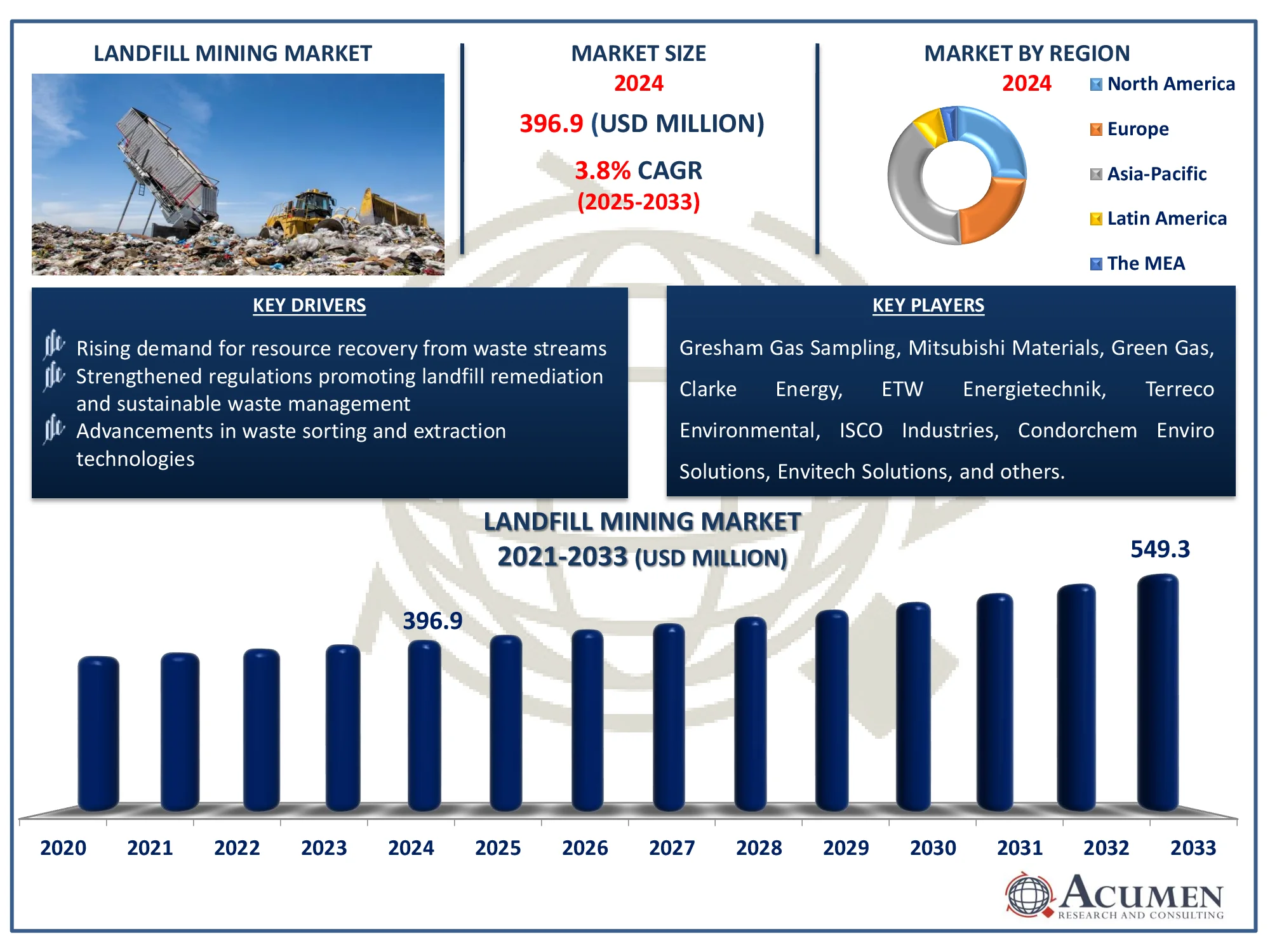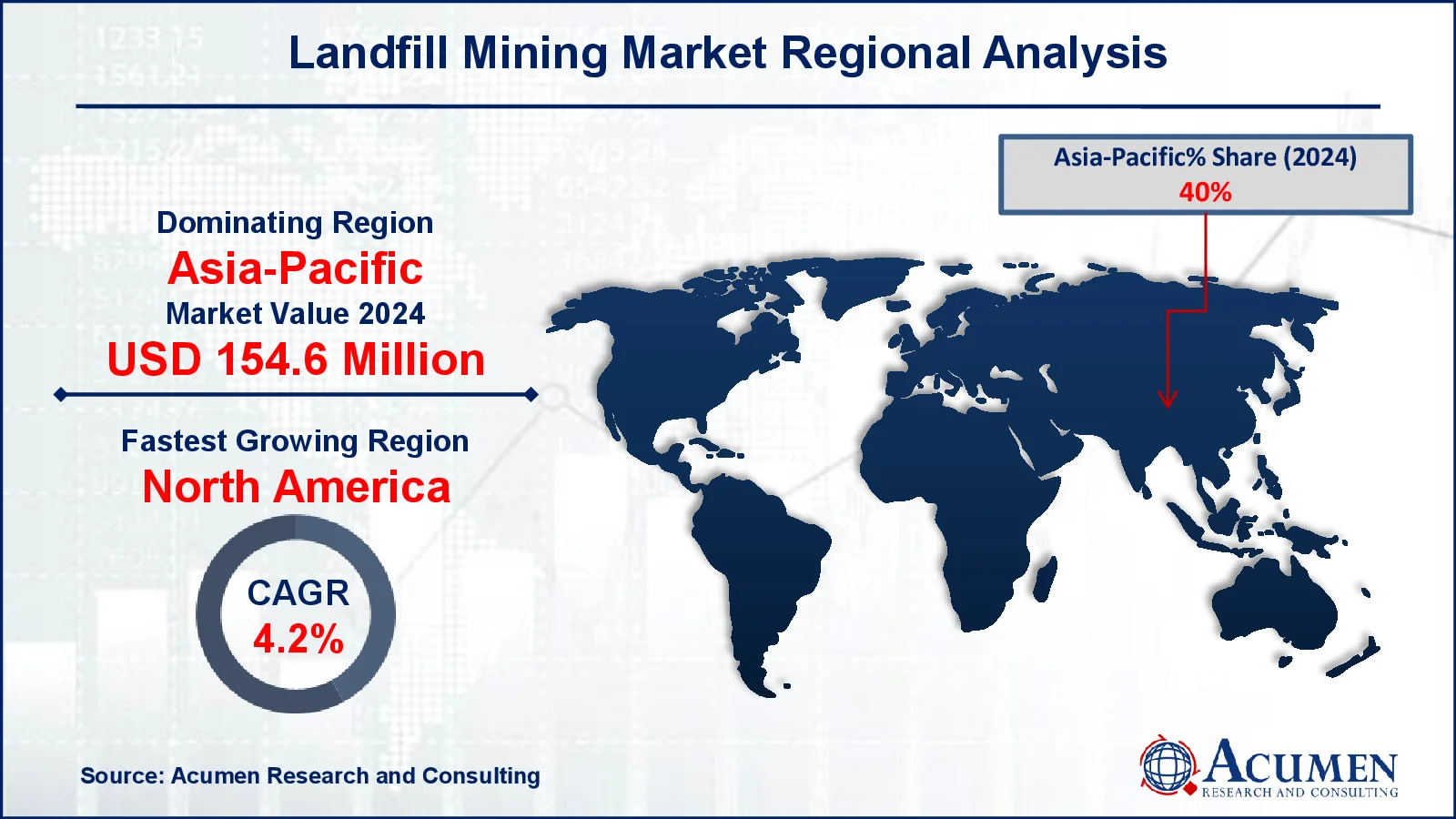February 2023
The Landfill Mining Market, which reached USD 396.9 Million in 2024 and is projected to grow to USD 549.3 Million by 2033, showcasing a steady CAGR of 3.8% from 2025 to 2033.
The Global Landfill Mining Market Size accounted for USD 396.9 Million in 2024 and is estimated to achieve a market size of USD 549.3 Million by 2033 growing at a CAGR of 3.8% from 2025 to 2033.

Landfill mining is the practice of excavating and recycling waste materials from landfills that have reached capacity or are no longer in active use. This method seeks to recover valuable resources such as metals, plastics, glass, and even organic materials like biomass and soil. The procedure usually entails meticulously excavating through layers of deposited rubbish, isolating recyclable or reusable components, and occasionally employing modern sorting technology to efficiently separate different types of waste.
Landfill mining aims to reduce the amount of garbage in landfills, retrieve valuable resources that can be reused or recycled, and potentially mitigate environmental damage caused by outdated disposal methods. It may also offer potential for recovering energy from trash through procedures such as incineration or anaerobic digestion. However, the viability and environmental impact of landfill mining can vary greatly depending on the dump's age and composition, local legislation, and technical improvements in garbage sorting and processing.
|
Market |
Landfill Mining Market |
|
Landfill Mining Market Size 2024 |
USD 396.9 Million |
|
Landfill Mining Market Forecast 2033 |
USD 549.3 Million |
|
Landfill Mining Market CAGR During 2025 - 2033 |
3.8% |
|
Landfill Mining Market Analysis Period |
2021 - 2033 |
|
Landfill Mining Market Base Year |
2024 |
|
Landfill Mining Market Forecast Data |
2025 - 2033 |
|
Segments Covered |
By Type, By Application, and By Geography |
|
Regional Scope |
North America, Europe, Asia Pacific, Latin America, and Middle East & Africa |
|
Key Companies Profiled Aviation |
Gresham Gas Sampling, Mitsubishi Materials, Green Gas, Clarke Energy, ETW Energietechnik, Terreco Environmental, ISCO Industries, Condorchem Enviro Solutions, Envitech Solutions, Salix Applied Earthcare, Edaphic Scientific, Rusmar, Groundwater Solutions, Dressta, Landsaver Environmental, and Bio-Gas Technologies. |
|
Report Coverage |
Market Trends, Drivers, Restraints, Competitive Analysis, Player Profiling, Covid-19 Analysis, Regulation Analysis |
One of the key drivers of landfill mining is the increasing recognition of landfills as potential sources of valuable materials, including metals, plastics, and organic matter. With global resource scarcity on the rise, landfill mining offers a sustainable alternative by recovering these resources for recycling and reuse, reducing dependence on raw material extraction.
Technological advancements have significantly enhanced landfill mining operations. Innovations in waste sorting, separation, and processing have made it easier to extract valuable materials from mixed waste streams. These advancements not only improve the economic viability of landfill mining but also contribute to environmental benefits by diverting waste from landfills and reducing associated ecological risks.
However, several challenges hinder the widespread adoption of landfill mining. High initial costs, complex waste extraction logistics, and regulatory barriers are among the major constraints. The handling and processing of diverse waste types, including hazardous materials, require meticulous planning and strict compliance with environmental and safety regulations. Additionally, public perception and acceptance play a crucial role in the feasibility of landfill mining projects, necessitating strong communication and community engagement efforts.
Despite these challenges, the landfill mining industry continues to evolve, driven by technological progress and a growing global commitment to sustainable waste management practices.
 Landfill Mining Market Segmentation
Landfill Mining Market SegmentationThe worldwide market for landfill mining is split based on type, application, and geography.
According to landfill mining industry analysis, municipal landfill mining is most prevalent due to the vast quantities of waste and the potential for recovering valuable recyclable materials, including metals, plastics, and organic matter. These landfills typically contain a diverse mix of waste that can be economically viable to extract and process.
Construction landfill mining follows closely, focusing on reclaiming materials such as concrete, bricks, and metals for reuse and recycling. In contrast, the mining of hazardous landfills is more restricted due to stringent regulatory requirements and the complex challenges of handling hazardous waste. While essential for environmental remediation, these operations require specialized processes and heightened safety measures, making them less common.
According to landfill mining market forecast, material recycling remains the dominant approach due to its widespread applications and strong economic viability. The increasing demand for resources like steel, aluminum, and copper has prioritized the recovery of valuable metals through recycling. This process involves sorting and processing waste to extract recyclable materials for reuse across various industries, including manufacturing and construction.
Thermal recycling, which recovers energy through methods such as incineration and waste-to-energy conversion, plays a secondary role due to environmental concerns and technological limitations. As a result, material recycling continues to be the most prevalent practice, aligning with global sustainability efforts and resource conservation initiatives.
North America
Europe
Asia-Pacific
Latin America
The Middle East & Africa
 Landfill Mining Market Regional Analysis
Landfill Mining Market Regional AnalysisIn terms of regional segments, the Asia-Pacific (APAC) region is emerging as a leader in landfill mining, driven by rapid urbanization, high waste generation, and growing initiatives for sustainable resource management. China and India are at the forefront of landfill mining efforts, fueled by large-scale urban expansion and industrialization, which have resulted in vast amounts of accumulated waste with potential for recovery and reuse. Government policies promoting environmental sustainability and resource conservation further accelerate the growth of landfill mining in APAC.
North America is expected to be one of the fastest-growing regions in the landfill mining market. This growth is largely driven by stringent environmental regulations, extensive landfill infrastructure, and a strong commitment to sustainable waste management. Europe is contributes to the notable growth of industry. European governments are increasingly investing in landfill rehabilitation and resource recovery projects to reduce landfill dependency and enhance material recycling. Advancements in waste-to-energy technologies and circular economy initiatives are further propelling the landfill mining sector. As Europe prioritizes environmental sustainability and resource efficiency, the region presents significant global expansion opportunities for landfill mining.
Some of the top landfill mining companies offered in our report include Gresham Gas Sampling, Mitsubishi Materials, Green Gas, Clarke Energy, ETW Energietechnik, Terreco Environmental, ISCO Industries, Condorchem Enviro Solutions, Envitech Solutions, Salix Applied Earthcare, Edaphic Scientific, Rusmar, Groundwater Solutions, Dressta, Landsaver Environmental, and Bio-Gas Technologies.
Looking for discounts, bulk pricing, or custom solutions? Contact us today at sales@acumenresearchandconsulting.com
February 2023
April 2020
October 2023
May 2023